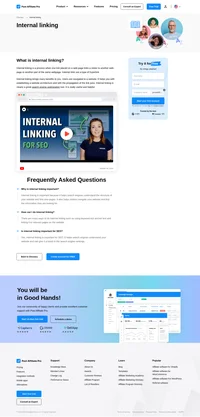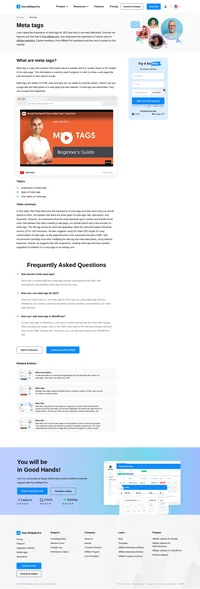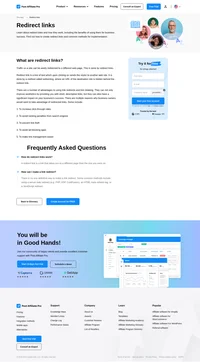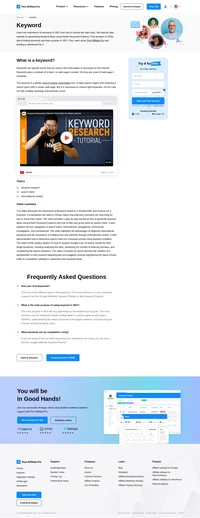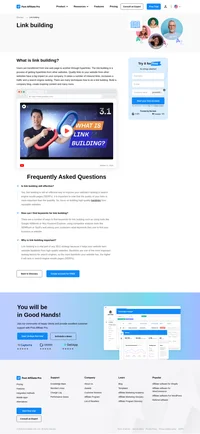What is a backlink?
Incoming links to a web page from outside domains are also called backlinks or inbound links. So, the backlink is a situation, when websites link to another webpage. They should be natural, it means – created without using artificial ways.
Backlinks are important to search engine rankings. More backlinks determine higher post because they define a website´s popularity. Companies have to monitor from where their backlinks are coming from. It is essential for a company to have backlinks from quality sites.
In other words a backlink is a hyperlink from one web page to another. In the context of search engine optimization (SEO), backlinks are vital as they serve as indicators of the value and credibility of a website. These links are essentially votes from other websites that vouch for the content’s quality. The more high-quality backlinks a website has, the more likely it is to rank higher in search engine results pages (SERPs). Backlinks remain one of the most significant factors in Google’s ranking algorithm, influencing how pages are perceived in terms of authority and relevance.

Types of Backlinks
- Dofollow Backlinks: These are standard links that pass on SEO value from the referring site to the linked site. They are considered valuable for improving a site’s search engine ranking. Modern SEO strategies emphasize acquiring dofollow links from authoritative and relevant sites to enhance domain authority and organic visibility.
- Nofollow Backlinks: These links have a rel=”nofollow” tag, instructing search engines not to pass on any SEO value to the linked site. While they don’t contribute directly to SEO rankings, they can still drive traffic and increase brand visibility. Nofollow links are commonly used in blog comments, forums, and some social media platforms to prevent spam and maintain link quality.
- Sponsored Links: These are links marked with a rel=”sponsored” attribute, indicating that they are part of paid advertising or sponsorships. Google requires such links to be tagged appropriately to distinguish between organic and paid content, helping maintain transparency and trust with users and search engines.
- UGC Links: User Generated Content links are labeled with rel=”ugc” to signify that they are part of user-generated content like comments or forum posts. This attribute helps search engines distinguish between content created by the site owner and content generated by users, aiding in maintaining content integrity.
Importance of Backlinks in SEO
Backlinks are a cornerstone of SEO because they act as endorsements for the linked site. Here’s why they matter:
- Authority and Trust: Backlinks from reputable sites signal to search engines that your site is trustworthy and authoritative. They play a crucial role in establishing the credibility of a domain, often reflected in higher domain authority scores.
- Traffic Generation: Beyond SEO, backlinks can drive direct referral traffic to your site. Effective link-building strategies often focus on attracting links from high-traffic sites to maximize referral traffic benefits.
- Discovery: They help search engines discover new pages on your site faster. When a page is linked from multiple external sites, search engines are more likely to find and index it promptly.
- Ranking Factor: Quality backlinks remain one of Google’s top-ranking factors, affecting how well your site performs in search results. However, the emphasis is on quality over quantity, with preference given to links from authoritative, relevant sources.
How Do Backlinks Impact SEO?
The impact of backlinks on SEO depends largely on their quality:
- Domain Authority: Links from sites with high domain authority are more valuable. Tools like Moz’s Domain Authority or Ahrefs’ Domain Rating provide insights into a site’s overall strength based on its backlink profile.
- Relevance: Backlinks from sites related to your niche carry more weight. The relevance of the linking site’s content to your own is a significant factor in determining the value of the backlink.
- Anchor Text: The clickable text of a link, known as anchor text, should ideally include relevant keywords for better SEO impact. Over-optimization of anchor text can lead to penalties, so a natural and varied approach is recommended.
- Link Placement: Links placed within the main content are more valuable than those in footers or sidebars. Search engines assume that editorially placed links within body content are more likely to be natural and relevant.
High-Quality Backlink Traits
- Trusted Source: They originate from authoritative and respected websites. A backlink from a .edu or .gov domain, for example, often holds more weight due to the inherent trust in these domains.
- Keyword-Rich Anchor Text: They include relevant keywords in their anchor text. However, this should be approached cautiously to avoid penalties for over-optimization.
- Topical Relevance: They come from content related to your website’s subject. A link from a site in the same industry or niche generally provides more SEO value than a link from an unrelated site.
- Dofollow Status: They are dofollow links, passing on SEO value. While both dofollow and nofollow links are natural in a backlink profile, dofollow links are generally more coveted for direct SEO benefits.
- Unique Domains: Links from a variety of different domains are more beneficial than multiple links from the same domain. This diversity indicates a wider endorsement of your content across the web.
Power of Affiliate Marketing Backlinks
In affiliate marketing, backlinks play a crucial role in boosting visibility and credibility. Here’s how they function:
What Are Affiliate Marketing Backlinks?
These are links from third-party websites (like blogs, forums, or social media pages) to your affiliate site. They are integral to an affiliate marketing strategy as they:
- Increase Traffic: Direct more visitors to your website, potentially boosting sales. Effective affiliate backlinks target audiences likely to convert, thus enhancing the ROI of affiliate campaigns.
- Enhance Authority: Improve your site’s domain authority by associating it with high-quality content. The quality of affiliate partnerships can significantly impact the perceived authority of an affiliate site.
- Broaden Reach: Allow you to tap into new audiences and markets through diverse platforms. Strategic placement of affiliate links across various high-traffic platforms can significantly extend brand exposure.
Challenges with Affiliate Links and SEO
While affiliate links are beneficial, they come with challenges:
- Nofollow Tags: Most affiliate links are tagged as “nofollow,” which means they don’t pass SEO value directly. This practice helps maintain the quality of link juice flowing through the web, preventing manipulation.
- Redirects: Some affiliate systems use redirects that can dilute the link’s SEO impact. Properly structured redirects are essential to preserve as much link equity as possible.
- Link Neutralization: Search engines may neutralize known affiliate links to prevent manipulation of SEO rankings. This necessitates a balanced approach to affiliate link placement within content.
Best Practices for Using Affiliate Links
- Use Quality Content: Ensure that the content surrounding your affiliate links is valuable and relevant to your audience. High-quality content enhances user experience and generates more natural engagement.
- Diversify Link Sources: Obtain backlinks from a variety of reputable sites. This diversity not only improves SEO but also increases the chances of reaching a broader audience.
- Optimize Anchor Text: Use natural and relevant anchor text to improve credibility. Avoid over-optimization and strive for a natural integration of links within content.
- Monitor Links: Regularly check the performance and status of your links to ensure they are functioning correctly. Tools like Google Search Console can provide insights into backlink performance and health.
- Disclosures: Follow legal requirements for disclosing affiliate relationships to maintain transparency with your audience. Transparency builds trust and aligns with guidelines from authorities like the FTC.
Backlinks are a powerful tool in both SEO and affiliate marketing. They not only enhance your site’s visibility and authority but also drive traffic and foster trust among users. By understanding the dynamics of backlinks and implementing strategic practices, businesses can significantly improve their online presence and achieve better SEO outcomes. For affiliate marketers, leveraging backlinks effectively can lead to increased conversions and sales, making them an essential component of a successful digital marketing strategy. As SEO continues to evolve, maintaining a diverse, high-quality backlink profile will remain a critical element of digital success.
![Youtube video: Proven Affiliate Link Building Tactics For Beginners [5.2]](https://www.postaffiliatepro.com/wp/urlslab-download/6e7a8b4804bf07cdda28276226e0fa2c/hqdefault.jpg)
Frequently Asked Questions
How can I get more backlinks?
There are many ways to get backlinks such as submitting articles to article directories, taking part in social media, and creating informative and high-quality content on your site.
Are backlinks important for SEO?
Backlinks are important for SEO because they help search engines determine the quality and relevance of a website.
Why are backlinks important?
Backlinks are important because they are a signal to search engines that your website is of high quality. When other websites link to your site, it shows that your content is valuable and relevant. This helps search engines rank your site higher in search results.
Discover the power of meta tags in boosting your website's visibility with insights from Neil Patel. Learn the importance of title, description, and keyword tags, and how to optimize them efficiently. Unlock the secrets to enhancing your PageRank with expertly crafted meta descriptions and stay ahead in search engine results.
Discover the power of link building with Post Affiliate Pro! Learn how acquiring quality backlinks can boost your website's traffic and search ranking. Explore techniques, from creating a compelling blog to building strong relationships, to enhance your SEO strategy. Visit us to elevate your digital presence today!
Discover the essentials of affiliate programs with Post Affiliate Pro. Learn how these marketing strategies can boost sales, brand awareness, and web traffic while offering high commissions and valuable resources. Uncover the pros and cons of different affiliate types and get insights into creating successful programs. Perfect for businesses aiming to enhance their marketing efforts and manage affiliates effectively.

